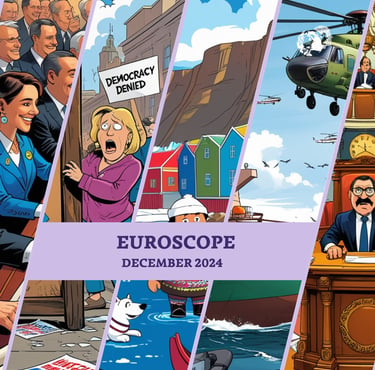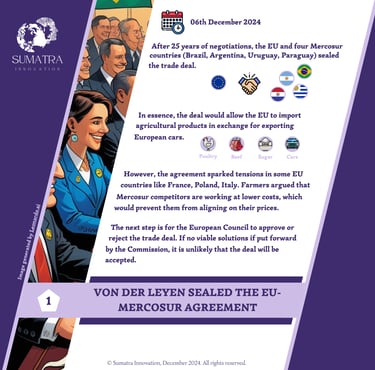Euroscope / December 2024



1/ von der Leyen sealed the EU-Mercosur Agreement
The trade agreement, which was concluded after 25 years of negotiations between the EU and the Mercosur countries (Brazil, Argentina, Paraguay and Uruguay) on December 6, 2024, could create one of the largest free trade areas in the world, covering over 700 million people and 20% of global GDP. Under the agreement, both blocs will benefit from trade growth thanks to the elimination of over 90% of tariffs and duties on goods exchanged between them. This will allow the EU, for example, to increase imports of agricultural products such as beef, sugar, soybeans or poultry, in exchange of exporting more European cars, which could benefit the struggling European car industry. However, the EU-Mercosur agreement has also attracted great criticisms. European farmers from France, Italy, Poland and Ireland, for example, have loudly expressed their concern that their Mercosur competitors are working at lower costs, which would not only affect their economic activities and competitiveness, but also prevent them from keeping their jobs. Climate activists are also angry about the agreement, as the production of agricultural commodities is the biggest cause of deforestation, biodiversity loss and greenhouse gas emissions. In addition, the Commission has not published detailed information about the negotiations and negotiating documents, which raises questions about the Commission's transparency, legitimacy and democratic throughput. In addition, Commission President Ursula von der Leyen took advantage of the domestic political crisis in France to push through the agreement, knowing full well that it is not supported by all member states. The next step is the approval of the trade agreement by the European Council, which requires at least 15 Member States representing at least 65% of the EU population. However, if the Commission is unable to offer viable solutions for European farmers, the opposing bloc, consisting of France, Austria and Poland, could be joined by other skeptical countries, that would block the agreement if these countries represent at least 35% of the EU population. Should the agreement be adopted, the European Parliament will have to ratify the provisions that fall under its exclusive competence (e.g. trade liberalization), while the national parliaments will have to ratify the remaining provisions (e.g. jurisdiction, investment protection, settlement mechanisms).
2/ Annulment of the Romanian Presidential elections
Two weeks after Călin Georgescu's victory in the first round of the Romanian presidential election on November 24, the election was annulled by the Romanian Constitutional Court due to Russian interference. This decision was made after the release of secret Romanian intelligence reports revealing an anti-Western propaganda campaign in support of Georgescu on TikTok, as well as several illegal operations in the financing of Georgescu's election campaign. Despite this, TikTok claimed that since September 2024, nearly 45 million fake likes and over 27 million fake follow requests were removed and more than 400,000 spam accounts were prevented from being created in Romania as part of TikTok's efforts to combat disinformation campaigns. The Romanian intelligence services also revealed that the country was the target of over 85,000 cyberattacks before and during the elections, targeting critical infrastructure and influencing public opinion through misinformation. The reactions to the annulment have deeply divided Romania's political landscape and undermined public trust. While Marcel Ciolacu, the sitting Prime Minister, said it was “the only right solution”, George Simion, leader of the far-right nationalist party AUR, claimed it was a “coup d'état in full swing”. Georgescu himself described the decision as “a barbaric act of the oligarchic state against democracy”. Following the court's decision to task the government with rerunning the entire electoral process, including the election campaign, the new Romanian presidential elections are expected to be held again in spring 2025.
3/ Greenland: in Trump's target, again
In a post on Truth Social on December 23, 2024, US President-elect Donald Trump reiterated his interest in acquiring Greenland, a self-governing territory of Denmark, recalling his similar claims from 2019 and Harry Truman's $100 million offer in 1946. This time, Trump cited national security concerns, claiming that US ownership of Greenland was an “absolute necessity” for global security and freedom. But Greenland's natural resources, such as gold, silver, copper and uranium, as well as access to the Arctic, where nations are competing for resources, are also a source of interest. Greenland's Prime Minister Múte Egede responded by declaring that the island was not for sale and never would be, a position shared by Denmark. Indeed, Danish Defense Minister Troels Lund Poulsen announced an increase in defense spending in Greenland of at least 1.3 billion euros, with the aim of increasing the island's defense capabilities by deploying more patrol vessels and long-range drones and upgrading airports to accommodate F-35 fighter jets. While Trump's message sounds like a continuation of his unconventional foreign policy approach, it is also important to note that other political analysts view Trump's call as a strategic move to pressure allied nations into negotiations and militarize the Arctic region against other powers like Russia.
4/ Finnish submarine cables damaged by Russian oil tanker
On December 25, Christmas Day, the Estlink2 submarine cable, which transmits electricity between Finland and Estonia, suffered an unexpected failure, while at the same time four telecommunications cables in the Baltic Sea were damaged. The Cook Islands-registered oil tanker Eagle S, carrying 35,000 tons of unleaded petrol, was blamed for dragging its anchor across the seabed after Finnish police boarded and seized the vessel, establishing a link between a missing anchor and drag marks on the seabed for dozens of kilometers. In response, Estonian Defense Minister Hanno Pevkur stated that the navy was sent to the proximity of Estlink 1 to defend and secure energy link with Finland. NATO will increase its presence in the Baltic Sea, as it did in October 2023 in response to similar incidents, when it deployed more maritime patrol aircraft, long-range radar aircraft and drones for surveillance and reconnaissance flights. Meanwhile, repairs to the 170km Estlink 2 interconnector will take months, probably until August 2025, and power distribution and communications services could be affected.
5/ Meloni's 2025 budget approved by the Italian Parliament
In contrast to France and Germany, the Italian parliament approved Meloni's 2025 budget on December 28, 2024, which aligns with the European Union's targets and instructions for reducing the deficit. The approved budget will reduce the budget deficit from 3.8% of GDP in 2024 to 3.3% in 2025 and below 3% in 2026, while also providing for tax cuts of €10 billion. For example, income tax for individuals with an annual income of less than €28,000 (€2,300/month) will be reduced from 25% to 23%, and families with an annual income of less than €40,000 (€3,300/month) will benefit from a bonus of €1,000 to tackle Italy's declining birth rate. The budget also leaves taxes on cryptocurrencies unchanged at 26%, which will then rise to 33% in 2026. Nevertheless, there is criticism, particularly regarding the pension increase (only €1.90/month) or the limited increase in funding for public services (e.g. education, research, healthcare).




